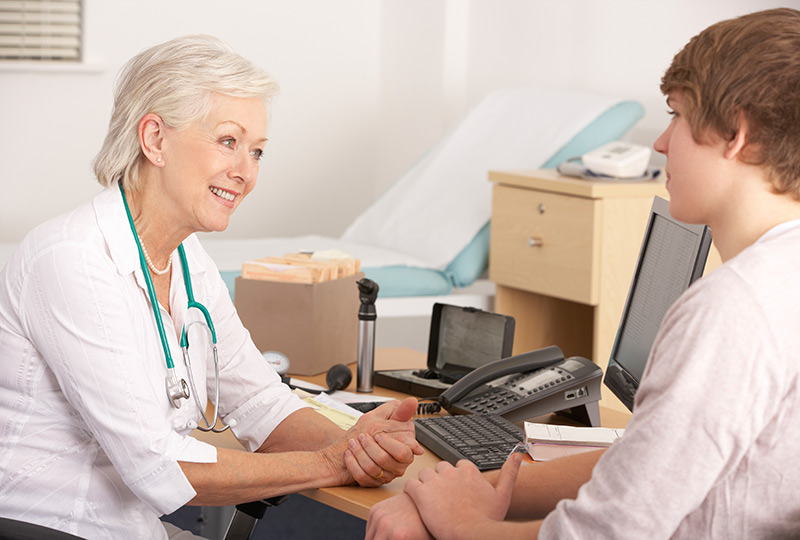The vaccine protects against more forms of cancer-causing HPV in males and females.
What if your doctor could give your child a vaccine to prevent certain types of cancers?
That vaccine exists for preventing most human papillomavirus-associated cervical cancers in women and oral and anal cancer in men and women. This vaccine also protects against HPV-associated genital warts.
There is now a third vaccine used to prevent HPV-associated cervical cancer, vulvar cancer and vaginal cancer in women; anal and penile cancer in men; and oral cancer and HPV-associated genital warts in men and women. The new 9-valent vaccine guards against more types of HPV and genital warts.
Before you brush off HPV as uncommon, the Centers for Disease Control estimates that about 80 million people in the U.S. — both women and men — were infected with HPV in 2015. A CDC study from 2013 showed that 26,000 new cancers were attributable to HPV each year in the U.S., about 17,000 in women and 9,000 in men. The CDC also estimates that at any given time 1 in 100 sexually active people have genital warts.
Mary Romano, M.D., MPH, a pediatrician at Monroe Carell Jr. Children’s Hospital at Vanderbilt, lays out the facts about the current vaccines.
What is different about this new vaccine?
Gardasil 9 protects against nine different strains of HPV, compared with four strains covered by the current Gardasil vaccine. This new vaccine has recently been approved for use in males up to age 26. It had previously been approved for females up to age 26.
Do we have to start over if I want my child to have the new HPV vaccine?
Absolutely not! If your child started the series with the older vaccine, simply finish the series with the newer nono-valent vaccine. This provides the added protection of the additional HPV strains included in this vaccine.
What is the recommended age for HPV vaccination?
Girls and boys age 11 and older should receive the HPV vaccine. However, even if your child did not receive the vaccine at this age, it can be given at any time up to age 26 for both males and females.
How important is the timing of the three doses of vaccine?
The recommended time frame to receive the vaccine is over a six-month period. However, your child should complete the vaccine series at any time even if missing a second or third vaccine. There is no need to restart the series if your child is late for a dose.
Should boys be vaccinated?
Yes! Boys who receive the HPV vaccine will be protected against HPV-associated oral, anal and penile cancers. They will also be protected again HPV-associated genital warts and they are less likely to pass HPV onto their future sexual partners.
What if I think my child is too young to be vaccinated?
Ultimately the decision to vaccine your child against HPV is your decision. However, a lot of research and thought goes into the recommendations on when a vaccine should be given. Because HPV is acquired through sexual contact (NOT just intercourse), it should be given before exposure to HPV occurs in order to be most effective. We also know that the body’s response to the vaccine is greatest in preteens versus teenagers and young adults. This means that the body develops a better protective response against HPV the earlier the vaccine is given.
Should someone receive the HPV vaccine if they’ve already become sexually active?
Yes! Although research shows that within a year of initiating sexual activity, 50 percent of people will acquire HPV, there is still a benefit to getting the HPV vaccine after starting sexual activity. There is no way of knowing what strain of HPV someone was exposed to, so receiving the vaccine will provide some protection against HPV and HPV-associated infections and cancers.
Is there any chance the vaccination can cause an HPV infection?
No. There is absolutely no evidence that receiving the HPV vaccine can cause an HPV infection. All three vaccines were extensively studied prior to being approved for use in preteens, teenagers and young adults. In addition, there has been ongoing monitoring of vaccine safety since its use. In fact not receiving the vaccine puts you at risk for infection with HPV and HPV-associated cancers.
Mary Romano, M.D., MPH, is an assistant professor of Pediatrics in the Division of Adolescent and Young Adult Health at Monroe Carell Jr. Children’s Hospital at Vanderbilt. She loves taking care of pre-teens and teens to keep them safe and healthy. She is the mother of two children.
Related: Should My Daughter Get the HPV Vaccine? Consult with your child’s pediatrician about the benefits of the new vaccine and what age it should be given.

